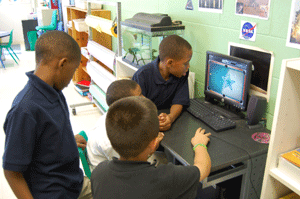 While fear that video game violence may influence children’s behavior dominates the video game debate, parents are also concerned that gaming may stunt creativity or emotional and social growth. Henry Jenkins, MIT Director of Comparative Studies, addresses parents’ concerns in an article on PBS.org, debunking common video game myths. (See below and previous posts.)
While fear that video game violence may influence children’s behavior dominates the video game debate, parents are also concerned that gaming may stunt creativity or emotional and social growth. Henry Jenkins, MIT Director of Comparative Studies, addresses parents’ concerns in an article on PBS.org, debunking common video game myths. (See below and previous posts.)
Myth #6. Video games discourage personal expression.
False. Video games have evolved from their rote action beginnings. Modern games not only engage problem-solving skills, they require players to make ethical judgments and allow players to observe the consequences of their decisions.
Myth #7. Gaming is socially isolating.
False. Nearly 60% of regular gamers play with friends; 33%, with siblings; and 25%, with parents or spouses, Jenkins says. Many games are designed for multiple players, and online games involve frequent social cooperation.
Myth #8. Gaming is desensitizing.
False. Gaming does not erase the ability to differentiate between the virtual and real world in emotionally healthy children. Video games, like make-believe play, offer children opportunities to express feelings and explore new activities vicariously.
Selecting video games
No scientific evidence indicates that video games are bad for children, Jenkins concludes. Educators have found that video games can be a powerful learning tool. Problems arise when parents fail to screen games or set limits on gaming activity. Parents can keep up on new games by reading reviews and watching game trailers. GameTrailers.com and Gamespot.com are two good resources.
Highly recommended children’s video games include (click link for reviews):
- Sesame Street: Once Upon a Monster
- Magic School Bus: Oceans
- Monkey Quest
- Kirby Mass Attack
- Skylanders Spyro’s Adventure






